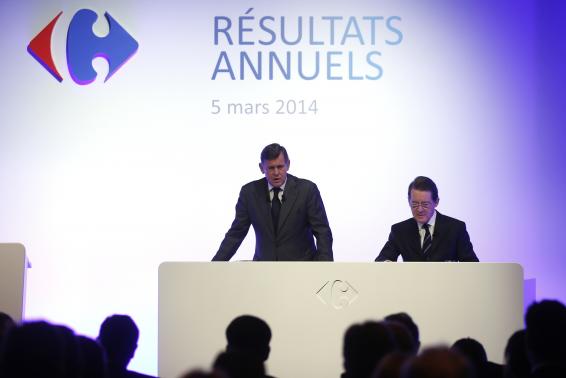 rld's second-largest retailer, reported a rise in profits on Wednesday as work on turning round its French business started to pay off and said it would spend more this year on reviving its European hypermarkets and expanding in China and Brazil.
rld's second-largest retailer, reported a rise in profits on Wednesday as work on turning round its French business started to pay off and said it would spend more this year on reviving its European hypermarkets and expanding in China and Brazil.The company said operating profits rose a slightly better than expected 5.3 percent to 2.238 billion euros ($3.1 billion) last year thanks to a sharp improvement in profitability at home as well as robust growth in Latin America, although Spain, Italy and Asia remained weak.
It also raised its dividend for last year by 7 percent to 0.62 euros per share.
"The dividend hike reflects the strong results that Carrefour delivered in 2013 thanks to the good execution of its action plan in France and its multi-format strategy amid a challenging economic climate," Chief Financial Officer Pierre-Jean Sivignon said on a conference call.
Shares in Europe's biggest retailer were 1.8 percent higher at 27.175 euros by 0830 GMT, when the French CAC 40 index .FCHI was down 0.2 percent.
Carrefour said it would invest between 2.4 billion and 2.5 billion euros to renovate and expand stores this year, up from the 2.2 billion in 2013, a rate of spending which analysts had expected would be unchanged in 2014.
Chief Financial Officer Pierre-Jean Sivignon told a results conference call that Carrefour would continue to renovate stores in France, Brazil, Italy and Spain in 2014, while expanding its store network in China and Brazil.
Carrrefour's decision to accelerate capital spending in 2014 contrasts with the situation at British rival Tesco (TSCO.L), which last month said would lower its overall capital expenditure as it was cutting back on expanding its net new store space.
However, Carrefour's capex to sales ratio of 2.9 percent for 2013 still lags the 3.2 percent achieved by Casino last year, while estimates for Tesco's ratio in 2013 stand at 4.6 percent, according to Thomson Reuters I/B/E/S Estimates.
Analysts also point out that Carrefour started its restructuring effort earlier than Tesco.
"Tesco are two years into the turnaround and are now giving themselves a further three year horizon to see positive results," Bernstein analysts said in a recent note.
"This is much like Carrefour from 2005, plenty of false dawns with declining market shares and with two margin resets already under their belt. There were many more to come before the first signs of stabilization in 2013."
STRONGER FRANCE
Carrefour, second only to Wal-Mart (WMT.N) among the world's biggest retailers, is battling to reverse years of underperformance in Europe, where it makes 73 percent of its sales. Its problems are partly due to a reliance on the hypermarket format it pioneered, as time-pressed customers shop more locally and online, and buy non-food goods from specialists.
Georges Plassat, who took over as chief executive 20 months ago, has had some success in the group's home market of France by cutting costs, revamping stores, improving price competitiveness, simplifying product offerings and giving more autonomy to store managers.
Carrefour said its operating margin in France, where it makes 47 percent of revenue, rose to 3.4 percent of sales, helping to lift the group margin to 3 percent from 2.6 percent in 2012, although that still lagged the 4.9 percent achieved by smaller French peer Casino (CASP.PA).
A stronger France helped counter a decline in the profitability for the rest of Europe, dragged down by Italy and Spain, while Asia also remained weak.
Many retailers across Europe have been struggling as shoppers' disposable income is squeezed by subdued wage growth and austerity measures, and most have responded with price cuts.
France, the euro zone's second-biggest economy, saw consumer spending fall 2.1 percent in January from December, against forecasts for a rise, dampening hopes of a consumer-driven recovery in the first quarter of 2014.
Carrefour shares rose 49 percent last year, welcome news for top stakeholder Blue Capital, controlled by LVMH (LVMH.PA) CEO Bernard Arnault, and U.S. investment fund Colony Capital.
The stock has dropped back by 7.5 percent so far this year, amid concern the recovery in France might be losing steam while there are headwinds in emerging markets.
But the shares still trade at around 16.5 times 12-month prospective earnings, against 14.53 for Casino and 11.17 times for Tesco, according to Thomson Reuters data.





